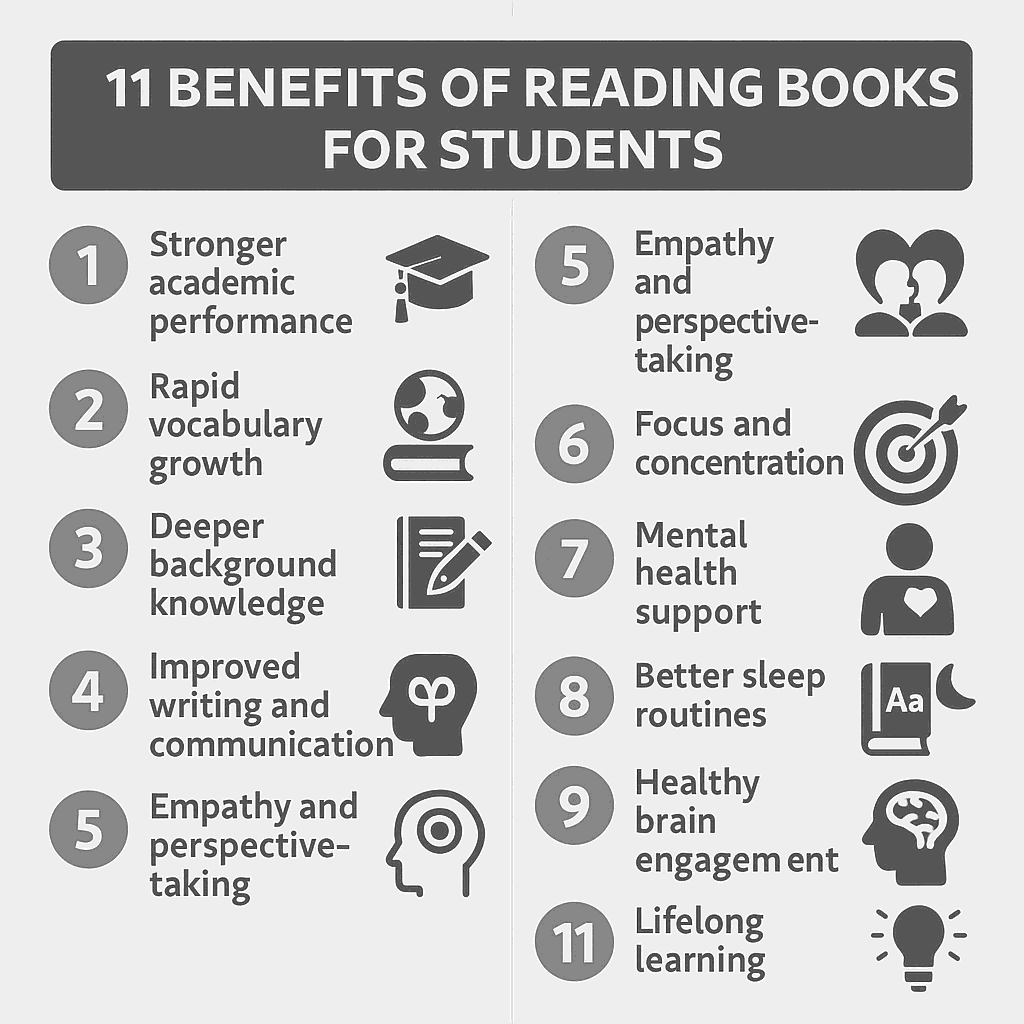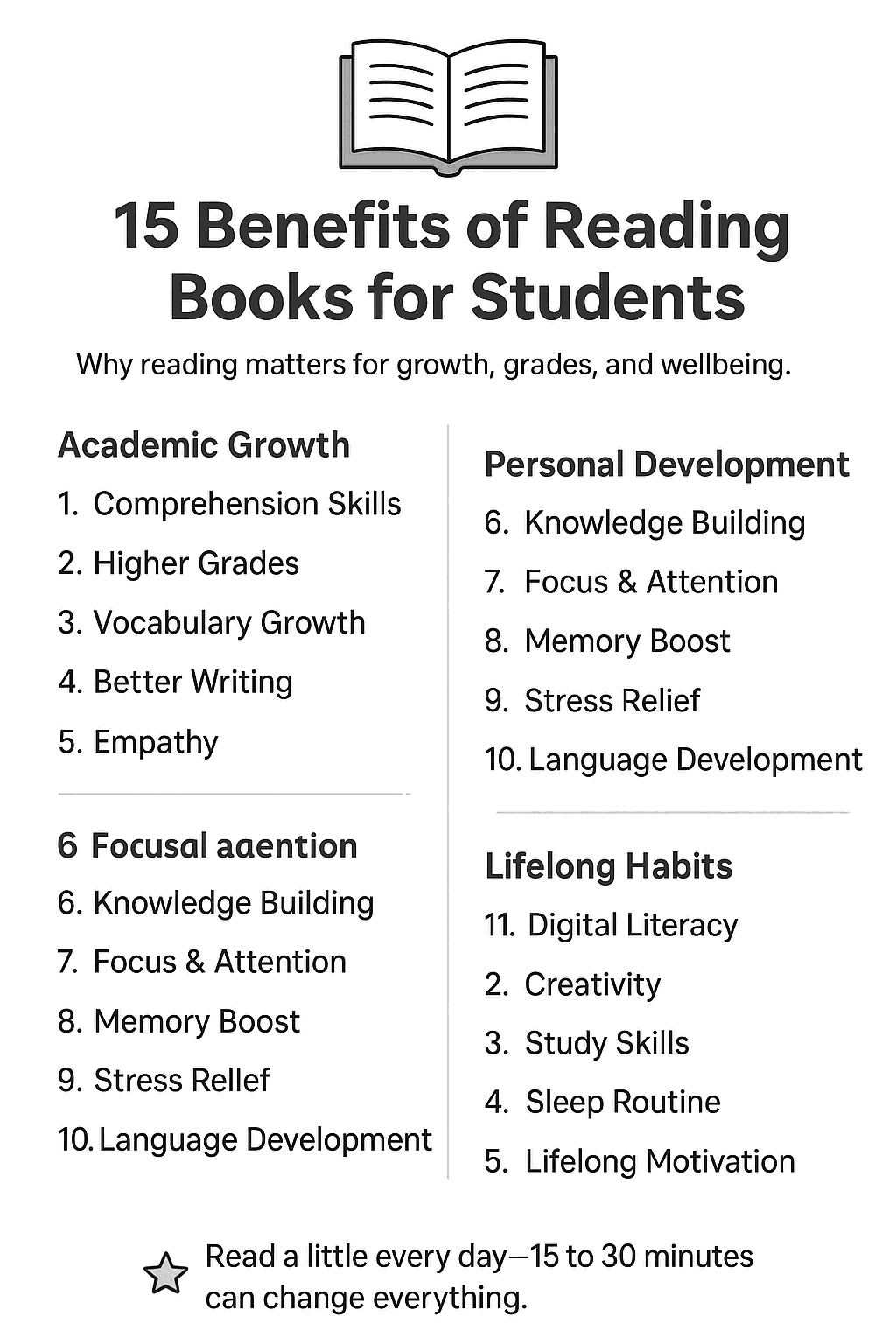
This guide gives students and families a clear picture of how regular reading helps with grades, language, thinking skills, and wellbeing. Educators can use the evidence to shape classroom routines, library choices, and homework that nudge a steady reading habit without pressure.
Table of Content
- The 11 Benefits of Reading Books
- Print or Screen? How to Use Each Well
- Building a Daily Reading Habit
- Book Selection Without Stress
- Research Snapshot
- Final Thoughts
- FAQs
The 11 Benefits of Reading Books

1) Stronger Academic Performance
Why it matters
Regular reading for pleasure tracks with higher achievement across systems. Analyses of international assessments show students who read for enjoyment tend to score higher, regardless of background.
A UCL study following adolescents also linked independent reading with higher test scores beyond socio-economic factors. Think of reading time as quiet, cumulative practice that shapes language, knowledge, and test stamina over months and years.
Try this
-
Set a simple target: 20–30 minutes on school nights.
-
Keep a “reading streak” calendar to build momentum.
-
Use teacher-guided “start a book in class” minutes; many students continue at home once they’re hooked.
2) Rapid Vocabulary Growth and Language Development
Why it matters
Books feed vocabulary in context. Experiments and classroom studies show that students pick up word meanings incidentally during normal reading, with gains compounding over many exposures. More pages read across the week multiplies encounters with word families, idioms, and academic language.
Try this
-
Keep a personal word bank with quick meanings and one sentence.
-
Favor series and authors you enjoy; repeated patterns help words stick.
-
Read aloud at home or in class; oral language supports word learning.
3) Deeper Background Knowledge for Better Comprehension
Why it matters
Knowledge acts like Velcro—new facts latch onto what you already know. In the classic “baseball study,” topic knowledge outweighed general reading ability when students explained a game play-by-play.
Content-rich reading across science, history, arts, and current events makes new texts easier to follow and remember.
Try this
-
Rotate nonfiction: biographies, explainer books, and accessible science.
-
Use a “wide-then-deep” approach: sample a topic, then dig into one subtopic for two weeks.
4) Improved Writing and Communication
Why it matters
Reading fuels writing, and writing about reading boosts comprehension. A major meta-analysis recommends short summaries, personal responses, and note-taking to lift reading outcomes.
Students who write frequently about texts process structure, argument, and tone, which carries into their own essays and presentations.
Try this
-
After a chapter, write a three-sentence summary.
-
Keep a quote-and-comment journal: one line from the book, one line from you.
-
Draft one paragraph that changes the point of view, then compare with the original.
5) Empathy, Perspective-Taking, and Social Understanding
Why it matters
Stories let students step into minds unlike their own. Some experiments find short-term gains in theory-of-mind tasks after reading literary fiction, though replications are mixed.
A practical takeaway: sustained exposure to character-rich narratives, over time, appears helpful for reading people as well as pages.
Try this
-
Pair novels with dialogue prompts: “What does this character want?” “What would you do differently?”
-
Use brief journaling after key scenes to connect feeling, choice, and consequence.
6) Focus, Concentration, and Study Stamina
Why it matters
Books train attention through longer stretches of single-task engagement. Research comparing print and screen reading shows that screens can invite skimming and overconfidence, especially when time feels tight.
Print tends to support measured pace and deeper processing for complex texts.
Try this
-
Use a 15-minute timer to start; extend by five minutes each week.
-
Mark chapter checkpoints to pause and recap in your own words.
7) Mental Health Support and Stress Relief
Why it matters
Reading gives many students a steady ritual that lowers stress. Reviews of bibliotherapy and related approaches report small to moderate benefits for mood and coping when reading is guided and paired with reflection.
Short fiction breaks can also offer healthy distraction during exam periods.
Try this
-
Keep a comfort shelf: poetry, short stories, or gentle humor for brief resets.
-
For tough days, choose light, familiar chapters and avoid heavy topics.
Reading is not a treatment; seek professional care for mental health needs. This section speaks to everyday stress only.
8) Better Sleep Routines (Print Before Bed)
Why it matters
Reading a printed book before bed supports wind-down time. In lab studies, evening use of light-emitting e-readers delayed melatonin, pushed bedtimes later, and reduced next-morning alertness compared with print.
A simple switch to paper in the last hour helps students protect sleep during exam weeks.
Try this
-
Create a “screens-off” buffer 60 minutes before sleep; keep a paperback on the nightstand.
-
Pick calm genres late at night: essays, biography, or low-stakes fiction.
9) Healthy Brain Engagement
Why it matters
Short reading interventions have shown temporary increases in functional connectivity in brain networks linked to language and sensory integration.
Students don’t need long technical texts for this benefit; steady, enjoyable reading keeps those circuits active.
Try this
-
Read daily, even on busy days; five to ten pages still count.
-
Mix formats: print at home, audiobooks on commutes, class read-alouds.
10) Second-Language Gains (Extensive Reading)
Why it matters
For learners of English or another language, extensive reading—lots of easy, interesting texts—raises reading proficiency and vocabulary over time.
Meta-analyses show small-to-medium effects across many studies and thousands of learners.
Try this
-
Choose graded readers at or below your comfort level; aim for speed and enjoyment.
-
Track pages or minutes, not only test scores; celebrate streaks.
11) Lifelong Learning and Cognitive Reserve
Why it matters
A reading habit builds knowledge that supports learning across subjects. Over the long haul, frequent cognitive activity, including reading, links with better cognitive function in later life in population studies.
Starting young helps students bank more of that practice.
Try this
-
Rotate genres to grow a broad base: history this month, science next, then memoir.
-
Keep a “what I learned” list at the back of each book.
Print or Screen? How to Use Each Well
What the studies say
-
Under time pressure or with expository texts, readers often understand print better and feel less overconfident about what they’ve learned. Screens can work, yet they can invite quicker skims.
Practical setup
-
For dense chapters, choose print when possible; if you must read on screen, switch off notifications, use a single window, and avoid scrolling layouts.
-
For lighter reading or reference checks, digital is convenient; export notes to a simple doc for review.
Building a Daily Reading Habit
Start small, keep steady
-
Pick a daily slot you can protect: after dinner, bus rides, or study hall.
-
Begin with 15–20 minutes and build up.
-
Keep book access easy: carry a paperback, save a free ePub for travel, visit the school or local library weekly.
Classroom moves that help
-
Start-a-book time in class raises the chance students keep going at home.
-
Use student choice and quick book talks; peers sell books better than any poster.
Book Selection Without Stress
-
Use the “interest first, level next” rule. A slightly easier book that grabs attention beats a hard book that gathers dust.
-
Mix fiction and nonfiction: narrative builds empathy and voice; nonfiction adds background knowledge that lifts comprehension across subjects.
-
Add diverse authors and settings so more readers see themselves—and meet lives unlike their own.
Research Snapshot
-
Students who read for pleasure tend to score higher in reading achievement across countries. Large PISA analyses connect reading enjoyment with better performance.
-
Time with print builds vocabulary through many small encounters with words during normal reading. Classic studies estimate meaningful gains from repeated exposure in context.
-
Prior knowledge boosts comprehension; in a well-known study, topic knowledge trumped general reading ability.
-
Writing about what you read strengthens reading comprehension; a major review recommends summaries, responses, and note-making.
-
Reading on paper tends to yield better comprehension under time pressure and for expository texts; screens can invite overconfidence.
-
Evening use of light-emitting e-readers delays sleep and melatonin; print before bed helps avoid that problem.
-
Reading is linked with empathy; short-term boosts appear in some experiments, with mixed replications. Long-term exposure may matter most.
-
Extensive reading supports second-language gains; meta-analyses show small-to-medium effects on proficiency.
-
Shared reading in early years supports language growth and caregiver-child bonding.
Final Thoughts
Reading works quietly. Minutes turn into pages, pages into ideas, and ideas into habits that shape school, work, and life. Pick books that invite you in, mark a daily slot, and let steady practice do its job.
The benefits of reading books for students stack up over time—no hacks, no shortcuts, just one good chapter after another.
FAQs
1) How many minutes should a student read each day?
Start with 20 minutes on school nights. Move toward 30–45 minutes as stamina grows. Short, predictable sessions beat long bursts once a week.
2) Is print better than digital for studying?
For complex chapters and under time pressure, print often wins on comprehension. Digital can work well for light reading or quick look-ups when you manage distractions.
3) Do fiction books help with social skills?
Some experiments show short-term gains in reading people after literary fiction, though replications are mixed. A steady diet of character-rich stories over months is a safer bet.
4) What about reading before bed?
Choose print near bedtime. Light-emitting devices late at night can delay melatonin and push sleep later.
5) Can reading boost a second language?
Yes. Extensive reading—lots of easy, enjoyable texts—shows small-to-medium improvements in proficiency across studies.
Also Read
7 Benefits of Student-Centered Learning (Backed by Research)



